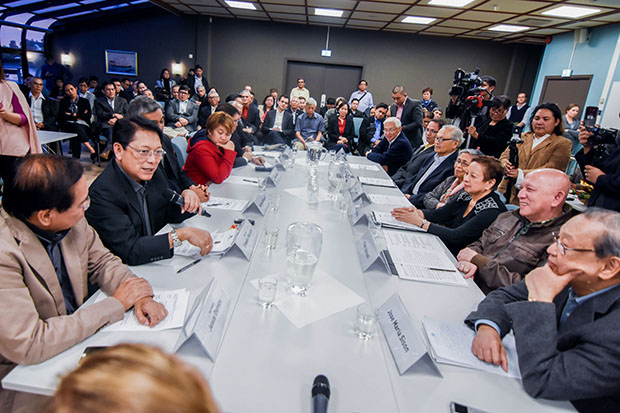 At the second round of GRP-NDF talks in Oslo, Norway on 6 October 2016. Photo courtesy of Edwin Espejo / OPAPP
At the second round of GRP-NDF talks in Oslo, Norway on 6 October 2016. Photo courtesy of Edwin Espejo / OPAPP
MALAYBALAY CITY (MindaNews / 1 December) – Various groups in the country hailed the decision of the Philippine government to resume peace negotiations with the National Democratic Front of the Philippines (NDFP), which was terminated in 2017 under the administration of then President Rodrigo Duterte.
“Cognizant of the serious socioeconomic and environmental issues, the foreign security threats facing the country, the parties recognize the need to unite as a nation in order to urgently address these challenges and resolve the reasons for the armed conflict,” the joint communique signed in Oslo, Norway on Nov. 23 said.
”The parties agree to principled and peaceful resolution of the armed conflict,” the communique added.
Reacting to the announcement, Gus Miclat, executive director of the International Initiatives for Dialogue, said, “The broad civil society and peace movement that have been supporting this peace process for the longest time, appreciate and welcome this positive development. With festering armed-conflicts happening in Myanmar, Palestine and elsewhere around the world, the revival of GRP-NDFP peace talks provides a different strategy that fosters conflict transformation through negotiated political dialogue.”
In a statement on Dec. 1, Miclat noted that since the termination of the formal talks, “we have seen how some groups weaponize existing security measures to justify red-tagging and human rights violations, mostly of individuals and groups engaged in the talks.”
“Hopefully, this renewed commitment to the peace talks of the Marcos government will provide a conducive atmosphere for genuine dialogue to thrive over other divisive agenda of parties consciously campaigning against the revival of the GRP-NDFP talks particularly the hawks and peace saboteurs,” he said.
Balay Mindanaw, meanwhile, in a statement on Nov. 28 said the development is a “positive step towards the transformation of this armed conflict by addressing the deep-rooted socioeconomic and political grievances.”
The group urged the negotiators from both sides “to remain steadfast as they navigate the difficult road to peace” given the “possible challenges this renewed talks could face.”
In a statement on Dec. 1, the Council of Leaders for Peace Initiatives said it agrees with the joint statement and the framework it articulates.
“But while we are optimistic, we are also mindful that there are still so many challenges to be faced and obstacles to be overcome as the peace process moves forward. We recall statements and actions in the past that have adversely impacted previous efforts to talk peace. We are all peace builders who must be mindful of ways that may thwart this new beginning. We call on all sectors to take this opportunity and nurture this still fragile breakthrough,” it cautioned.
On Nov. 29, the ecumenical group Pilgrims for Peace also welcomed the resumption of the peace talks.
The group asked the Philippine government to act on matters raised by the NDFP, particularly the release of its peace consultants to enable them to participate in the peace process and the removal of the terrorist designation of the NDFP, Communist Party of the Philippines, New People’s Army, and Luis Jalandoni and other NDFP personnel under the Anti-Terrorism Act of 2020.
“We also encourage a general, unconditional and omnibus release of all political prisoners,” it added.
The official announcement of the revival of the peace talks came after President Ferdinand Marcos Jr. issued Proclamations 403 to 406 granting amnesty to several rebel groups, including former members of the communist movement. (MindaNews)
